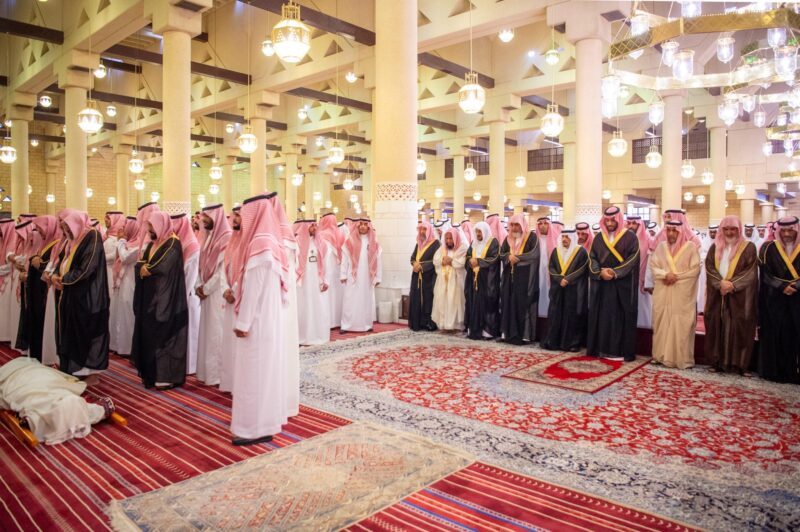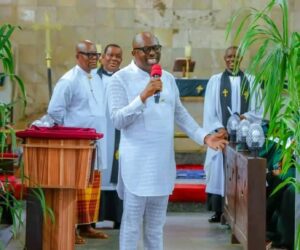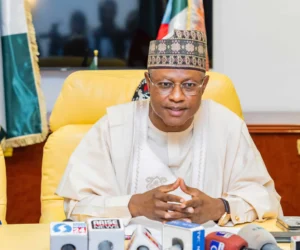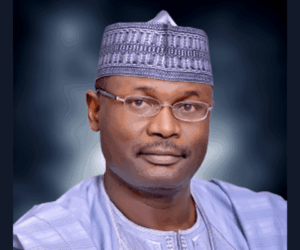Saudi Arabia’s Grand mufti, Sheikh Abdulaziz bin Abdullah Al-Sheikh, died on Tuesday after having served as the kingdom’s top religious authority for more than two decades.
Sheikh Abdulaziz was appointed in 1999 to the head of the Council of Senior Scholars, a government body that issued religious edicts. His passing marks the end of a long and influential era in Saudi religious life.
The Saudi royal court announced the mufti’s death in a statement. It did not include his age or cause of death, but he was believed to be 82 years old, according to multiple Saudi media.
SPONSOR AD
Details regarding his final resting place were not made public, but it is customary in the kingdom for burials to follow immediately after funeral prayers at a nearby cemetery.
The funeral prayer for Sheikh Abdulaziz was held at the Imam Turki bin Abdullah Mosque in Riyadh, the Saudi capital, after the Asr prayer, with large numbers of officials, scholars, and citizens in attendance.
In a statement, the Royal Court said: “With the passing of Al-Sheikh, Saudi Arabia and the Islamic world have lost a distinguished scholar who made significant contributions to the service of Islam and Muslims.”
Funeral prayers in absentia were also offered for the late grand mufti after the Asr prayer at the Grand Mosque in Makkah, the Prophet’s Mosque in Madinah, and in all mosques across Saudi Arabia. This was in line with a directive issued by the Custodian of the Two Holy Mosques, King Salman.
Several regional emirs, deputy emirs, governors, senior officials, scholars, and a large number of the faithful attended the prayers.
Emir of Madinah Prince Salman bin Sultan was among those who performed prayer at the Prophet’s Mosque. Makkah Deputy Emir Prince Saud bin Mishaal offered the funeral prayer at King Salman Mosque in Jeddah.
The worshipers prayed to Almighty Allah to shower the deceased with His abundant mercy and forgiveness, and to grant him a high place in paradise, and to reward him for the great services he rendered to his nation as well as to the Islamic and Arab world.
Profile
Sheikh Abdulaziz served as the head of the Council of Senior Scholars, Saudi Arabia’s top religious body. In June 1999, King Fahd appointed him as the grand mufti of Saudi Arabia as the successor of Sheikh Abdul Aziz Ibn Baz.
He was a member of the Al ash-Sheikh family, a lineage with deep roots in Islamic scholarship.
Born on November 30, 1943, in Makkah, Sheikh Abdulaziz memorized the Holy Qur’an at an early age. He lost his sight at 17 and grew up as an orphan, yet remained steadfast in his pursuit of knowledge.
In 1961, he enrolled in the College of Shariah at Imam Mohammad bin Saud Islamic University in Riyadh, graduating in 1965 with a specialisation in Arabic and Islamic Shariah.
Despite his visual impairment, he went on to serve on academic councils at various universities and became a respected preacher. His scholarly contributions include extensive writings on Islamic doctrine, lawful and prohibited matters, and compilations of fatwas.
In 1965, Al-Sheikh was appointed a teacher at Imam al-Dawa Scholarly Institute in Riyadh. He taught there for eight years before transferring to the College of Shariah at Imam Mohammad bin Saud Islamic University, where he worked as an assistant professor and then as an associate professor.
He also taught at the Higher Institute of Judiciary in Riyadh and became a member of several academic councils in Saudi universities.
Sheikh Abdulaziz became imam and preacher at Sheikh Muhammad bin Ibrahim Mosque in Dakhnah, Riyadh, then served as imam of Friday Prayer at Sheikh Abdullah bin Abdullatif Mosque before becoming the imam of Imam Turki bin Abdullah Mosque.
In 1982, Sheikh Abdulaziz was appointed as the imam and preacher of Namirah Mosque in Arafat. For 33 consecutive years, until 2014, he delivered the pivotal Arafat sermon from this sacred site.
Renowned for his unwavering dedication to religious service, Sheikh Abdulaziz became the most prolific Hajj preacher in history.
Each year, his sermons reached millions of pilgrims gathered in Makkah and Medina, making his voice and message an integral part of the Hajj experience. Revered across generations, he remained a trusted spiritual figure whose legacy continues to resonate.
In 1991, he became a full-time senior member of the Permanent Committee for Scholarly Research and Ifta. In 1995, he was appointed Deputy Grand Mufti of Saudi Arabia.
Sheikh Abdulaziz leaves behind a powerful legacy of religious leadership. His wisdom, deep knowledge, and calm presence made him a key voice in Saudi society. He played a strong role in preserving Islamic traditions.
He was widely respected across the Islamic world. His sermons and rulings shaped public thought and policy in Saudi Arabia. His guidance reached far beyond the Kingdom. Many Muslims followed his teachings for decades.
Fatwas and publications
Throughout his tenure, Sheikh Abdulaziz Al-Sheikh was instrumental in interpreting Sharia law and issuing fatwas on various legal and societal matters.
He emphasised the importance of unity within the Muslim community and worked towards bridging divides among different Islamic sects. His leadership was characterised by a commitment to preserving Islamic traditions while addressing contemporary issues facing the Muslim world.
Like many Saudi religious scholars, Sheikh Abdulaziz espoused a strict and deeply conservative interpretation of Islam. In 2004, he made headlines after he criticized the mixing of unveiled women with men at an economic forum in Jeddah.
As mufti, he ran a popular call-in radio show that received queries from listeners, issuing religious edicts on the spot.
In one ruling, he described the game of chess as the “work of Satan.”
However, in 2005, he issued a ruling banning forced marriages, and in 2018, he formally backed the decision allowing women to drive.
Sheikh Abdulaziz has several publications on Fiqh provisions, doctrines, and Fatwa, among other Sharia sciences.
They include “The Book of Allah, the Almighty, and its Glorious Position,” “The Meaning of our Testimony that Muhammad is the Messenger of Allah,” and “A Collection of the Sermons of Arafah.”
He also published several books on Fatwas that he addressed in the “Nur ‘Ala al-Darb” Ifta program, notably “The Book on Fatwas on Doctrines,” “Fatwas on Purity and Prayers,” “Provisions and Fatwas on Zakat,” “Fatwas on Fasting,” “Fatwas on Hajj,” “Fatwas of Sheikh Abdulaziz Bin Abdullah Bin Muhammad Al al-Sheikh,” “Messages of Sheikh Abdulaziz Bin Abdullah Bin Muhammad Al Al-Sheikh,” “Nur ‘Ala al-Darb Fatwas – The Book on Doctrines,” and “Nur ‘Ala al-Darb Fatwas – The Book on Purity and Prayers.”
Condolences
Pakistan President Asif Ali Zardari and Prime Minister Shehbaz Sharif expressed grief over his death, calling it a “great loss” for the Muslim world.
The Supreme Fatwa Council of Syria also extended its condolences to Saudi Arabia.
In a written statement sent to SANA on Tuesday, the council praised Sheikh Abdulaziz’s decades-long service to Islamic scholarship, religious guidance, and Dawah, calling his contributions “a great legacy in the service of Sharia.”
The Grand Mufti of Egypt, Dr. Shawky Allam, expressed his condolences, offering prayers for the deceased and his family.








